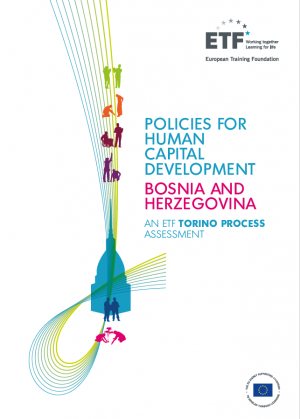The European Training Foundation (ETF) assessment provides an external, forward-looking analysis of human capital development issues in Bosnia and Herzegovina and vocational education and training (VET) policy responses from a lifelong learning perspective. It identifies challenges related to education and training policy and practice that hinder the development and use of human capital. It takes stock of these challenges and puts forward recommendations on possible solutions to address them.
These assessments are a key deliverable of the Torino Process, an initiative launched by the ETF in 2010 aimed at providing a periodic review of VET systems in the wider context of human capital development and inclusive economic growth. In providing a high-quality assessment of VET policy from a lifelong learning perspective, the process builds on four key principles: ownership, participation, holistic and evidence-based analysis.
The ETF interprets human capital development as the provision of support to countries for the creation of lifelong learning systems. These systems in turn provide opportunities and incentives for people to develop their skills, competences, knowledge and attitudes throughout their lives so that they can find employment, realise their potential and contribute to prosperous, innovative and inclusive societies.
The purpose of the assessments is to provide a reliable source of information for planning and monitoring education and training policies for human capital development. The assessments are also intended to initiate a dialogue on the programmes and policies supported by the European Union (EU) and other donors.
The ETF assessments rely on evidence collected from the countries using a standardised reporting template (national reporting framework) in a Torino Process country report. The Torino Process report for Bosnia and Herzegovina (referred to in this assessment as the Bosnia and Herzegovina report) was compiled by a local expert contracted by the ETF. At the time of writing this ETF assessment, the Bosnia and Herzegovina report had not been endorsed by the Bosnia and Herzegovina authorities. The ETF takes full responsibility for the content of the assessment covered in this report.
The assessment starts with a brief description of the strategic plans and policy priorities in Bosnia and Herzegovina (Section 1). It then presents an overview of issues related to the development and use of human capital in Bosnia and Herzegovina (Section 2), before moving on to a discussion of problems in this area, which in the view of the ETF require immediate attention (Section 3). Section 4 provides the overall conclusions of the analysis. Annex 1 provides a summary of the recommendations in the report.

